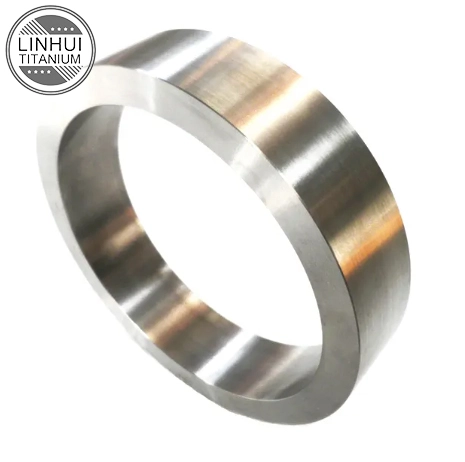Titanium Ring Forging
Standard: ASME SB381 / ASTM B381
Grade: Gr1,Gr2,Gr3,Gr4,Gr5,Gr7,Gr9,Gr12
Outside Diameter: Φ100-900 mm
Inner Diameter: 80-300 mm
Thickness: 15-300 mm
Material: Pure titanium/Titanium alloy
Ring forgings are ring-shaped parts made from metallic materials. Titanium Ring Forging is commonly used in large machinery, building structures, and other heavy industrial applications. Ring forgings have a very high level of durability and reliability, so they are often used in applications that require high levels of stress and heavy loads.
Product Information
| Product name | Titanium Ring Forging |
| Standard | ASME SB381 / ASTM B381 |
| Grade | Gr1,Gr2,Gr3,Gr4,Gr5,Gr7,Gr9,Gr12 |
| Outside Diameter | Φ100-900 mm |
| Inner Diameter | 80-300 mm |
| Thickness | 15-300 mm |
| Material | Pure titanium/Titanium alloy |
| Ti Content (%) | >99.7% |
| Technique | Melting, Forging, Annealing, Machining |
| Surface | Polished |
| Density | 4.51g/cm3 |
| Tolerance | H6~H13, h10~h13 |
| Processing Service | Bending, Welding, Decoiling, Cutting, Punching |
| Application | Precision instruments, Navigation, Aerospace, Auto industry, Medical industry, Electric power industry, Metallurgical industry |
Usage of ring forgings
Ring forgings are commonly used in building structures, large machinery, and the metallurgical industry. Their uses include the following:
Building structures: In building structures, ring forgings are often used as part of the weight-bearing and supporting external components. For example, conveyors used to transport ore require large ring forgings to maintain their structural stability.
Large machinery: Titanium Ring Forging is also commonly used in heavy machinery. For example, giant wind turbines require large ring forgings to maintain their structural stability.
Metallurgy: In the metallurgical industry, ring forgings are often used to produce high-strength alloys. High-strength alloys require high-temperature forging, and ring forgings can withstand such high-temperature impacts, making them indispensable production equipment.
Maintenance of ring forgings
Ring forgings require regular maintenance and care to ensure the stability of their performance and function. Below are a few common ways to maintain ring forgings:
Regular Inspection: Regular inspection of ring forgings is the key to maintenance. It ensures that ring forgings are free of cracks or other damage, as well as minimizing the failure rate of ring forgings.
Lubricant Inspection: Lubricant plays a key role in the maintenance of ring forgings. The lubricant needs to be kept at the proper level or it will cause friction and wear.
Cleaning: Ring forgings need to be kept clean to prevent dust and dirt from accumulating on their surfaces. Regular cleaning reduces rust and looseness.
Reduce pressure: Ring forgings are susceptible to high pressures during operation. Avoid sudden speed changes and overloading, which reduces the pressure on ring forgings and therefore reduces ring wear.
Temperature monitoring: Ring forgings are subject to deformation due to temperature changes. Therefore, temperature monitoring is necessary. Temperature monitoring ensures that operating temperatures do not exceed the limits of linear expansion, thus reducing wear on ring forgings.
Ring forgings are an important part used in a wide range of applications in building structures, large machinery, and the metallurgical industry. They play an important role in the mechanical and structural fields. To maintain the proper function and performance of ring forgings, regular maintenance and care is required. By following these maintenance methods, damage and failure of ring forgings can be minimized and their service life can be extended.
About us
Linhui Titanium mainly produces and processes titanium and titanium alloys, Titanium Ring Forging, tungsten, molybdenum, and zirconium, with titanium bars, titanium plates, titanium tubes, titanium wires, titanium products, and titanium forgings as supporting products. It is a processing enterprise integrating design, development, production, and sales.












